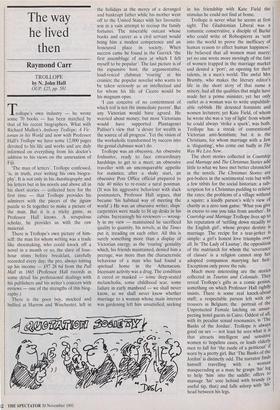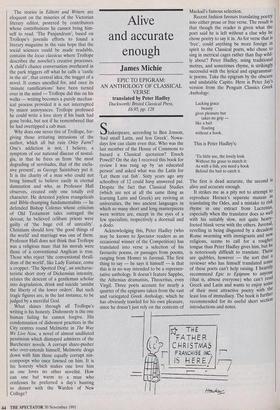The way he lived then
Raymond Carr
TROLLOPS by N. John Hall OUP, £25, pp. 581 Trollope's own industry — he wrote some 70 books — has been matched by that of his recent biographers. What with Richard Mullen's Anthony Trollope: A Vic- torian in his World and now with Professor Hall's Trollope we have some 12,000 pages devoted to his life and works and are duly informed on everything from his doctor's address to his views on the annexation of Fiji.
`The man of letters', Trollope confessed, `is, in truth, ever writing his own biogra- phy'. It is not only in his Autobiography and his letters but in his novels and above all in his short stories — collected here for the first time — that Trollope provides his admirers with the pieces of the jigsaw puzzle to fit together to make a picture of the man. But it is a tricky game, as Professor Hall knows. A scrupulous scholar, he provides us with the raw material.
There is Trollope's own picture of him- self: the man for whom writing was a trade like shoemaking, who could knock off a novel in a month or so; the slave of four- hour stints before breakfast, carefully recorded every day; the pro, always totting up his income — £97 28 6d from the Pall Mall in 1865 (Professor Hall records in some detail his professional dealings with his publishers and his writer's concern with reviews — one of the strengths of this biog- raphy.) There is the poor boy, mocked and bullied at Harrow and Winchester, left in
the holidays at the mercy of a deranged and bankrupt father while his mother went off to the United States with her favourite son in a vain attempt to recoup the family fortunes. The miserable outcast whose books and career as a civil servant would bring him a modest competence and an honoured place in society. When success came he found in the Garrick 'the first assemblage of men at which 1 felt myself to be popular'. The last picture is of the expansive host, the argumentative, loud-voiced clubman `roaring' at his cronies; the popular novelist who wants to be taken seriously as an intellectual and for whom his life of Cicero would be his magnum opus.
`I can conceive of no contentment of which toil is not the immediate parent'. But any Victorian would have agreed. He worried about money; but most Victorians would have supported Plantagenet Palliser's view that 'a desire for wealth is the source of all progress'. Yet the vision of the workaholic transformed by success into the genial clubman won't do.
Trollope was an obsessive. An obsessive foxhunter, ready to face extraordinary hardships to get to a meet; an obsessive traveller with an unconquerable appetite for statistics; after a shaky start, an obsessive Post Office official prepared to ride 40 miles to re-route a rural postman. (It was his aggressive behaviour with slack postmasters, Professor Hall argues, that became 'his habitual way of meeting the world'.) He was an obsessive writer; ships' carpenters were made to fit up desks in his cabins. Increasingly his reviewers — wrong- ly in my view — maintained he sacrificed quality to quantity, his novels, as the Times put it, treading on each other. All this is surely something more than a display of Victorian energy, as the `roaring' geniality which, his friends maintained, denied him a peerage, was more than the characteristic behaviour of a man who had found a spiritual home in the Athenaeum. Incessant activity was a drug. The condition it cured or masked — some deep-seated melancholia, some childhood scar, some failure in early manhood — we shall never know, as we shall never know whether marriage to a woman whose main interest was gardening left him unsatisfied, seeking in his friendship with Kate Field the stimulus he could not find at home.
Trollope is never what he seems at first sight. The Gladstonian Liberal was a romantic conservative, a disciple of Burke who could write of Robespierre as `sent into the world to prove the inefficacy of human reason to effect human happiness'. He believed that all women must marry; yet no one wrote more movingly of the fate of women trapped in the marriage market and denied a `port', an opening for their talents, in a men's world. The awful Mrs Brumby, who makes the literary editor's life in the short story of that name a misery, had all the qualities that might have made her a prime minister, yet her only outlet as a woman was to write unpublish- able rubbish. He detested feminists and women lecturers; yet Kate Field, of whom he wrote she was a 'ray of light' from whom he could always 'strike a spark', was both. Trollope has a streak of conventional Victorian anti-Semitism; but it is the Christians, for whom marriage with a Jew is `disgusting', who come out badly in The Way We Live Now.
The short stories collected in Courtship and Marriage and The Christmas Stories add little to what we have met better chronicled in the novels. The Christmas Stories are pot-boilers in the sentimental vein but with a few titbits for the social historian: a sub- scription for a Christmas pudding to relieve the rates; the problems of a village without a squire; a kindly parson's wife's view of charity as a zero sum game: 'What you give in excess to one you take from another'. In Courtship and Marriage Trollope lives up to his reputation of `settling down steadily to the English girl', whose proper destiny is marriage. The recipe for a tear-jerker is simple: a girl's honest love triumphs over all. In 'The Lady of Launay', the opposition of the matriarch for whom the 'severance of classes' is a religion cannot stop her adopted companion marrying her heir. Exceptions only prove the rule.
Much more interesting are the stories collected in Tourists and Colonials. They reveal Trollope's gifts as a comic genius, something on which Professor Hall rightly insists. There is some real knock-about stuff; a respectable parson left with no trousers in Belgium; the portrait of the Unprotected Female latching on unsus- pecting hotel guests in Cairo. Oddest of all, with its peculiar sexual resonances, is `The Banks of the Jordan'. Trollope is always good on sex — not least he sees what it is that attracts intelligent and sensitive women to hopeless cases, or leads elderly men to fall for `the rustle of a petticoat' if worn by a pretty girl. But `The Banks of the Jordan' is distinctly odd. The narrator finds himself travelling with a woman masquerading as a man; he grasps 'his' leg to help 'him' into the saddle; offers to massage `his' sore behind with brandy useful tip, that) and falls asleep with his head between his legs. The stories in Editors and Writers are eloquent on the miseries of the Victorian literary editor, pestered by contributors whose contributions he cannot bring him- self to read. 'The Panjandrum', based on Trollope's juvenile efforts to found a literary magazine in the vain hope that the social sciences could be made readable, contains the locus classicus where Trollope describes the novelist's creative processes.
A child's chance conversation overheard in the park triggers off what he calls a 'castle in the air', that central idea, the nugget of a novel. It comes uncalled for, and once its `minute ramifications' have been turned over in the mind — Trollope did this on his walks — writing becomes a purely mechan- ical process provided it is not interrupted by minor annoyances. Trollope professed he could write a love story if his bank had gone broke, but not if he remembered that he had overtipped a cab man.
Why does one never tire of Trollope, for- giving those irritating intrusions of the author, which all but ruin Orley Farm? One's addiction is not, I believe, a symptom of our national disease of nostal- gia, in that he frees us from 'the most degrading of servitudes, that of the exclu- sive present', as George Saintsbury put it. It is the charity of a man who could not bring himself to believe easily in eternal damnation and who, as Professor Hall observes, created only one totally evil character. He detested joyless evangelicals and Bible-thumping fundamentalists — he defended Bishop Colenso whose criticism of Old Testament tales outraged the devout; he believed celibate priests were guilty of 'the huge evil of unreality'. Christians should love 'the good things of the world' and marriage was one of them. Professor Hall does not think that Trollope was a religious man: that his morals were those of a conventional Anglican is true. Those who reject 'the conventional thrall- dom of the world', like Lady Eustace, come a cropper. 'The Spotted Dog', an uncharac- teristic short story of Dickensian intensity, relates the descent of a gentleman scholar into degradation, drink and suicide 'amidst the liberty of the lower orders'. But such tragic figures are, in the last instance, to be judged by a merciful God.
What shines through all Trollope's writing is his honesty. Dishonesty is the one human failing he cannot forgive. His condemnation of dishonest practices in the City centres round Melmotte in The Way We Live Now, a novel of almost undiluted pessimism which dismayed admirers of the Barchester novels. A corrupt share-pusher who over-extends himself, Melmotte drags down with him those equally corrupt nin- compoops who once fawned on him. It is his honesty which makes one love him as one loves no other novelist. How can one but warm to a man who confesses he preferred a day's hunting to dinner with the Warden of New College?











































































 Previous page
Previous page